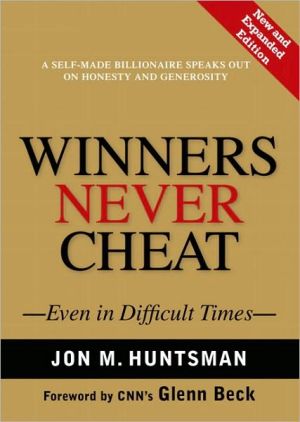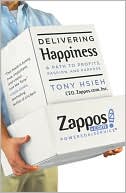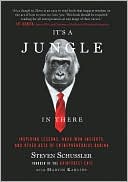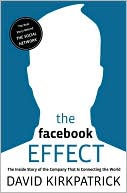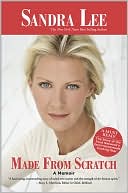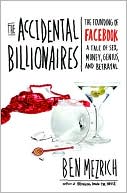Winners Never Cheat: Even in Difficult Times
The nationwide bestseller--fully updated for today’s tough times and worldwide financial crises\ “Everyone does it.” Everyone cheats. Cuts corners. Tells lies. Maybe it was different once. Not today. If you want to succeed in this economic climate, you simply have to make compromises. Right?\ Wrong. You can succeed at the highest levels, without sacrificing the principles that make life worth living. The proof? You’re holding it.\ Jon M. Huntsman built a $12 billion company from scratch, the...
Search in google:
Author royalties from this book go to the Huntsman Cancer Foundation“The way Jon conducts his business and lives his life will not only inspire you to be a better person, citizen, and entrepreneur, it also will give you hope that the good guys don't finish last.”Glenn Beck"Jon Huntsman is a different breed. He believes business is a creative endeavor, similar to a theater production, wherein integrity must be the central character."Larry King, CNN"Jon Huntsman's own life and personal values lend credence to his words. He walks his ethical talk."Neil Cavuto, Fox News"This book could put me out of business. Nobody would be happier about it than me."Wayne Reaud, Trial Attorney.The nationwide bestseller—fully updated for today’s tough times and worldwide financial crises“Everyone does it.” Everyone cheats. Cuts corners. Tells lies. Maybe it was different once. Not today. If you want to succeed in this economic climate, you simply have to make compromises. Right? Wrong. You can succeed at the highest levels, without sacrificing the principles that make life worth living. The proof? You’re holding it.Jon M. Huntsman built a $12 billion company from scratch, the old-fashioned way: with integrity. There were short-term costs and difficult decisions. There were tough times. Times just like today. But ultimately, leading with integrity wasn’t just personally right for Huntsman, it also proved to be the best business strategy.In Winners Never Cheat, Huntsman tells you how he did it, and how you can, too. This book is about remembering why you work, and why you were chosen to lead. It’s about finding the bravery to act on what you know is right, no matter what you’re up against.It’s about winning. The right way.Think about the kind of person you want to do business with. Then, be that person—and use this book to get you there.
IntroductionIntroductionGood Times, Bad Times\ Circumstances may change but your values shouldn't\ When I wrote the original edition of this book in the fall of 2004, I had experienced four decades in the business world. My life had been enriched in every aspect. Like others before me, I discovered that ''happiness is not the absence of conflict, but the ability to cope with it." I had witnessed it all: the greed, the cheating, the lying, and the selfishness. And the triumphs, the miracles, the rages-to-riches, and the flim-flam folks.\ Or so I thought. It turned out I was wrong. There have been sequels galore on the downside (and a few on the up). As I write these lines in the fall of 2008, ethical corner-cutting has risen faster than the price of a gallon of gas. Even those tough, cold winters in rural Idaho were easier to swallow than some of today's Wall Street trickery. Traditional values appear to be as in vogue as a subprime loan.\ The good times of 2004 to 2007—record markets, sizzling real estate, easy credit, relatively acceptable energy costs—conspired to make us morally flabby. It is easy to take the high road when the route is leading to better times. Generosity isn't difficult when money flows.\ Historically, positive economic scenarios are followed by painful downturns. The result presents new temptations to bend rules, to hoard material possessions, and to dismiss decency as being so last year. Born of anger, fear, stress, and frustration, the temptation to cut a corner is strong and persuasive. For the honest of heart—life's real winners—times like this are just another passing test.\ When reaping an abundant harvest, most of us keep our senses—the common variety and in relation to fair play. Yet, it is quite apparent, given the amount of irresponsibility, cheating, fraudulent behavior, and pure greed that has recently been exposed, that not everyone was playing by the rules. Indeed, the breadth and depth of abhorrent behavior from this minority were startling. From subprime loan scams to speculation on the oil markets to crises in the insurance and financial sectors to falsifying the financial conditions of companies, ethical abuses, and the scope of government bailouts have been jaw-dropping.\ Unfortunately, doing it the "right way" seldom cushions economic blows. Such letdowns can leave one confused and angry, but it is no time to panic, to lose track of our moral compass. On my mother's tombstone in Fillmore, Utah, are etched Shakespeare's immortal words: "Sweet are the uses of adversity." Surefire winners understand this adage. Crises must and can be resolved in moral ways. In so doing, keep in mind two things:\ \ The situation hardly ever is as bad as it seems. It will pass. Better times are ahead. If nothing else, history tells us that. Americans inherently tend toward optimism. It is in our genes. The fact is, the past 20 years, overall, have been fairly good to us.\ Prosperous times are no guarantee we will adhere to a morally righteous path. Most people strongly adhere to a fixed code of ethics whether the economy is up or down, but some feel a sense of need for even more financial gain, regardless of the consequences.\ \ The subprime mortgage and energy price debacles were conceived in a bed of raw greed, from a dream of getting something for nothing. They were born with illusions of easy, riskless, endless money. The erosion of moral values is the natural progression of this mindset. Such obsessions require the redrawing of ethical boundaries. This sort of greed destroys the financial and emotional underpinnings of others. For some, the idea of finding a morally acceptable alternative is placed on "call waiting" until the nefarious goal is reached.\ When ethical boundaries are redrawn or removed, the addiction to wealth becomes all- consuming. When expediency trumps propriety, it results in an escalating toboggan ride down a mountainside, a descent impossible to stop until the sled crashes from excessive speed and lack of direction. The late '90s dot-com burst was evidence enough. Perhaps the hedge funds of today will be the next exhibit.\ This scenario results from a flawed rationale. The "objective" or "goal" is an illusion because it is based on an ethically bankrupt premise from which nothing positive can be achieved. The goal can never be reached. There will never be "enough" money; there will never be "enough" power. Thus, the "success" some envision will never be attained. A crash nearly always follows a dizzying display of "success" that is not solidly based in economic and ethical fundamentals. You can be sure the Piper will demand payment.\ If everything were fair in life, perpetrators of economic meltdowns would be the only ones who suffered for their impropriety. But life isn't fair, and the fallout too often envelops good people who played by the rules, who trusted institutions, who are left to survive the rocky times brought on by others. The innocent are made to suffer for the sins of the reckless, the greedy, the cheats, the fast-buckers, the indecent, and the liars. With tough times comes another kind of temptation: the perceived necessity to cut corners, to cling to what you have, to rationalize that traditional values can be jettisoned if the ship is sinking. During this period, one can easily fall into the trap described by William Wrigley, Jr.: "A man's doubts and fears are his worst enemy."\ The confusion, frustration, stress, and fears that come with financial dilemmas can make even the most ethical of individuals vulnerable to bad choices. Nevertheless, reminding ourselves of the moral path and disciplining ourselves to follow it can sustain us in such trying moments. If there is a silver lining to bad times, it is this: When facing severe challenges, your mind normally is at its sharpest. Humans seldom have created anything of lasting value unless they were tired or hurting.\ A discussion involving ethics can be easily misunderstood by some minds. In reality, it is quite simple. The adherence to an ethical code is best defined as how one honors a bad situation or a bad deal. Heaven knows it is easy enough to honor a good deal, or to take advantage of an event or circumstance that is rewarding and beneficial to all sides.\ My company, Huntsman Corp., has completed a court trial in Delaware, as I write this. The entire case centered around the other party trying to break a contract with us. Economic conditions changed somewhat between entering the contract a year ago and when it was to be executed, and the other company's prospects of going forward are far bleaker than when they signed the deal.\ One of the lawyers for the company that signed the "iron-clad" contract with us but tried to back out made an interesting statement to the judge. "This is a very tight contract," she told the judge. "Therefore, we must look for any loopholes possible to try and extricate my client from honoring the contract." The judge didn't buy it and required the company to keep its word.\ Unfortunately, this sort of behavior happens on too many occasions. With crafty lawyers, it sometimes works. Most of the time, however, iron-clad contracts simply are what they were intended to be from the start: maintaining a binding agreement between two parties. And how one honors situations when things turn sour or when a deal ends up being more costly than originally thought is how one defines his or her personal values.\ In survey after survey, Americans of all stripes—Republicans, Democrats, Baptists, Jews, Unitarians, liberals, conservatives, the rich, and the poor—indicate they are worried about values. I certainly am. Some shout their angst for all to hear; others express their concerns quietly. Civilization has basic standards for proper and right-thinking action. That was the theme of Winners Never Cheat: Everyday Values We Learned as Children (But May Have Forgotten) when it was first published, and it remains so with this updated version.\ I don't have to paint detailed landscapes. Each reader is able to point to his or her own painful experiences starting in 2007. The scenario is neither mysterious nor coincidental: Unbridled greed often prompted unethical, reckless behavior that temporarily turned on the money spigot and fueled the hysteria for many. The shock, anger, and heartbreak took place in Act II.\ The twin tragedy is that generosity becomes expendable in times of contraction. The basic urge to share, instilled in us from youth, is dulled by the self-centered instinct to survive. Is anyone surprised that charitable donations decreased in the second half of 2007 and have tanked in 2008? Are we surprised that civility and decency have taken back seats when we are in survival mode? Yet, tolerance and charity also are pillars of ethical behavior. In good times and in bad, our values insist we act graciously and generously.\ Most of us care about one another. Human beings have considerably more in common with one another than they do differences. One's religion, political persuasion, family, financial and social status, or vocation does not hamper the common thread of personal decency running through most of humankind. In spite of America's fervent embrace of self-reliance, the vast majority of us believe in taking care of one another. Albert Schweitzer said it well: "You don't live in a world all your own. Your brothers are here, too."\ An ethical code of conduct is a nondenominational religion to which all but hardcore sociopaths can subscribe. Ethical responsibility is the gold standard for determining civilized, decent courses of action. Without established and commonly accept values, the earth turns into a global food fight.\ It is important for societies to settle on a set of values common to most and generally applicable to most every instance. There cannot be separate sets of ethics for home, for work, for church, and for play. Ethics belong in the home and the boardroom. And although it may seem that playing fields have changed because of unusual pressures or that rules have become malleable to accommodate unexpected situations, core values remain as solid as concrete.\ Because of recent events, I saw a need to write an updated version of this book—not that what I said the first time is no longer in play. On the contrary—it remains as relevant today as it did when I originally wrote it, as unchanged as when I first learned ethical principles six decades ago. It will hold true 60 decades from now, as well.\ This version of Winners Never Cheat is presented as a warning that in the darkest of times, temptation will be most alluring. These are times for a mid-course pep talk, a reminder to stay the course, to run the good race, to fight the good fight, to follow the rules we learned long ago. They will see us through hardships and help us make ourselves and the world better off.\ Periodic reviews of one's ethical stances are healthy. Times change, situations change, lives change, technology changes. Situations may be altered; basic values must not.\ The simplest rules of good behavior injected into us as children, like vaccines, become the prompts for ethical behavior as adults.\ Tough times must not be allowed to vanquish us. We are equipped with the values that have accompanied us since our earliest years. That preparation provides us with the strength to weather storms.\ Sail on...\ © Copyright Pearson Education. All rights reserved.
Introduction Good Times, Bad Times 1Ch. 1 Lessons from the Sandbox 11Ch. 2 Check Your Moral Compass 25Ch. 3 Play by the Rules 39Ch. 4 Setting the Example 53Ch. 5 Keep Your Word 77Ch. 6 Why We Cross the Line 95Ch. 7 Pick Advisors Wisely 107Ch. 8 Get Mad, Not Even 125Ch. 9 Graciousness Is Next to Godliness 139Ch. 10 Your Name Is on the Door 157Ch. 11 The Obligation to Give Back 171Ch. 12 The Bottom Line 193Perspective from Larry King 207Perspective from Neil Cavuto 215Perspective from Wayne Reaud 221
